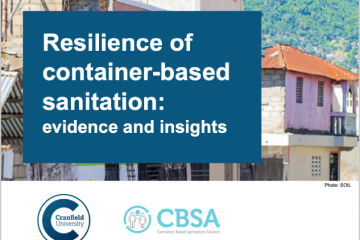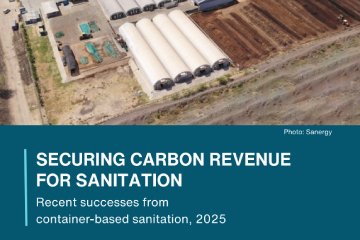In 2023, USAID published Managing the climate impact of human waste – a study to understand the impact of methane emission from faecal sludge and potential abatement approaches, calling for investment into CBS for its high methane abatement potential.
The report examines the current sources and drivers of methane emissions from sanitation systems in low- and middle-income countries (LMIC) contexts and identifies promising approaches and interventions for adoption as well as evidence gaps.
CBS – ‘a high-potential option for methane reduction’
CBS is assessed as a high-potential integrated technology and service system (p34-36) with significant potential for methane abatement across the sanitation chain because:
- Containment emissions are minimal since no water seeps into the waste, and high emptying frequency minimises the time allowed for anaerobic conditions.
- Treatment emissions can be controlled to a greater degree by adopting aerobic technologies like composting, or by capturing methane from the waste having relatively high organic content.
- Reuse of products (instead of discharge) supports carbon sequestration of fresh waste with high organic content by converting it to usable products like biomass and biogas fuels, fertilizer, or animal feed with lower GWP than methane emissions.
The way forward – ‘invest in CBS now’
In chapter 7. The way forward, the report makes practical recommendations for immediate action around four key areas:
- Implement proven solutions where they are contextually appropriate.
- Experiment with promising interventions to generate evidence for further scaling.
- Innovate to address gaps in the identified abatement approaches.
- Create a favourable enabling environment to increase awareness of the climate impact of sanitation systems and incentivise the adoption of more climate-friendly technologies and services.
CBS is one of the very options included under proven solutions to implement now (p44) for specific contexts due to its ability to reduce emissions in the immediate term. The report also highlights the comparative cost-effectiveness of CBS as well as its ability to address physical challenges associated with constructing and emptying traditional containment facilities.
The report estimates that adoption of CBS by populations using dry pit latrines with unlined pits below the groundwater table in urban sub-Saharan Africa could reduce projected methane emissions in 2030 by around ~12.0 percent.
Transitional solutions essential for leaving no one behind
The report also points to some limitations around CBS, such as governments in LMICs not viewing CBS as an alternative to sewered sanitation systems. It is true that CBS is often seen as a temporary solution with flush toilets still widely seen as the most desirable form of sanitation. CBS providers understand and respect this. However, with a billion people living in informal areas globally and sewers not likely in the short to medium term, transitional solutions are needed now.
Non-sewered solutions such as CBS can play a critical role to fulfil people’s basic right to sanitation until permanent solutions are rolled out. CBS can also be a valuable tool through its ability to create demand for other sanitation options, demonstrating that investment in CBS can be an investment in the wider sanitation market.
CBS – good for mitigation and for adaptation
In addition to the mitigation benefits highlighted by the report, it should be noted that CBS is also climate resilient. Thanks to its removable and sealable container, CBS systems are climate resilient and can survive, function and quickly recover in the face of climate-related shocks, chronic stresses and seasonal variabilities, such as flooding and drought, to ensure that faecal matter is safely contained throughout the sanitation service chain. CBS toilets will never fill up or leave faecal sludge untreated to contaminate the environment and risk causing disease during flooding when they can be sealed to ensure no waste is released. A dry sanitation solution, CBS is also particularly well-suited to areas prone to water scarcity and drought, which is becoming more and more a driver for CBS solutions.
As we navigate the complexities of climate change and strive to ensure access to dignified sanitation for all, embracing CBS now is not just a pragmatic choice but a moral imperative, safeguarding both our environment and the well-being of communities worldwide.


